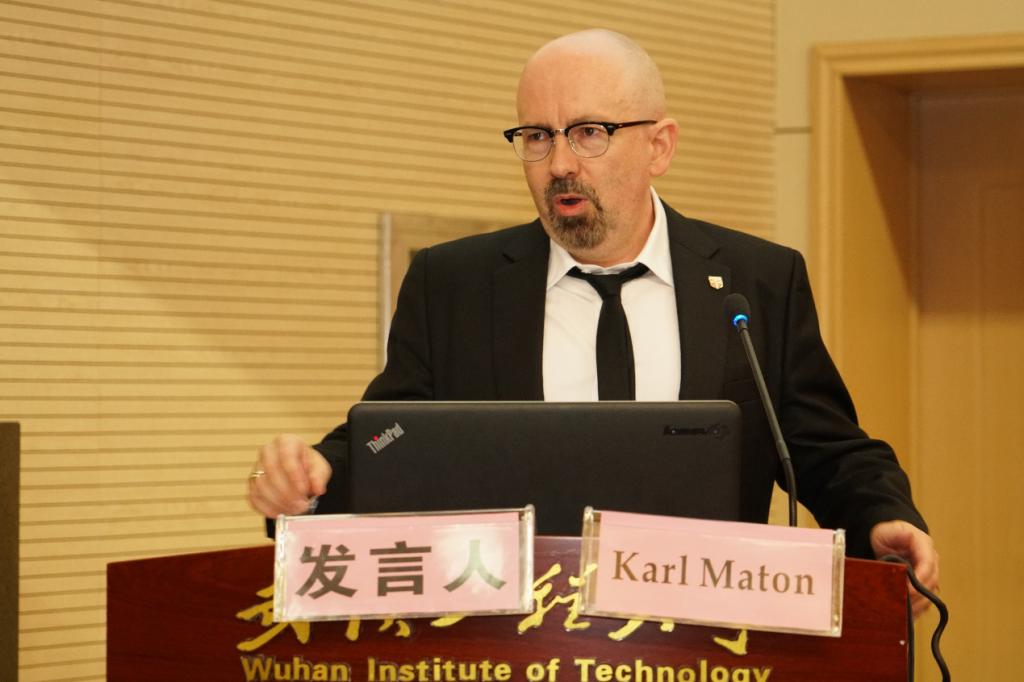Karl Maton:Integrating knowledge:How LCT could help support English with other subjects
原创:Karl Maton整理:张艳梅 2019-4-1
编者按
2019年3月29日至31日,由bat365官方官网和中国学术英语教学研究会联合主办,外语教学与研究出版社、上海外语教育出版社、北京文华在线教育科技股份有限公司协办,bat365官方官网bat365在线登录入口网页版承办的“新时代跨学科复合型英语人才培养模式国际研讨会“在bat365官方官网成功召开。研讨会共有12位来自海内外的知名专家做大会主旨发言,其中杨信彰教授、雷蕾教授、Karl Maton 、Jinyan Huang、John Spiridakis、Bruce Morrison六位专家全程用英文做主旨发言。现将六位主旨发言专家的发言摘要分6篇依次整理或简要介绍,以飨读者。
本文为第1篇,对来自澳大利亚悉尼大学的Karl Maton教授于2019年3月30日上午在“新时代跨学科复合型英语人才培养模式国际研讨会“上所作的大会主旨发言作简要介绍,并附上英文摘要对照稿。

Professor Karl Maton
Karl Maton教授所作的英文主旨发言题为“Integrating knowledge:How LCT could help support English with other subjects”(知识整合: LCT 如何能够协助将英语融入其他学科)。
教育领域的一个关键问题是如何整合不同类型的知识。在许多国家,中学教师和大学讲师必须将教学技巧与具体学科融合,学者们也通常需要在研究中应用不同原则来进行整合研究。在“跨学科英语”中,如何将英语融入其他学科显得尤为重要。Karl Maton教授的主旨发言,简述了LCT理论中的概念将如何帮助解决这个问题。
LCT是一个分析和实践的理论框架,它是跨学科的国际学者及教育工作者都关注的焦点。Karl Maton教授特别讨论了“自主性密码(autonomy codes)”的新概念。“自主性密码(autonomy codes)”是将知识从何而来以及出于何种目的使用知识概念化,从一些课堂调查的大数据中提取可用于教学实践的内容。
由于LCT在各个科目都适用,Karl Maton教授在主旨发言中所举的例子不是关于“跨学科英语”的,而是从澳大利亚高中历史课堂上找到的实例。Karl Maton教授在大会发言中详细分析了教师如何整合两种不同类型的知识(学术型历史和常识型历史),在具体分析过程中,Karl Maton教授向与会学者展示了“自主游览(autonomy tours)”的特殊教学方式。“自主游览(autonomy tours)” 的特殊教学方式能成功地将不同类型的知识整合起来,同时它也反映出教师可能无法很好地整合不同类型的知识的局限。
附:Karl Maton教授简要介绍及发言英文摘要
Professor Karl Maton
Director, LCT Centre for Knowledge-Building, University of Sydney
Professor Karl Matonis Director of the LCT Centre for Knowledge-Building at the University of Sydney in Australia and Visiting Professor at Rhodes University and the University of the Witwatersr and in South Africa. Professor Maton completed three degrees at the University of Cambridge and moved to Australia in 2005.·Professor Maton is the creator of Legitimation Code Theory(LCT), a framework For studying and shaping knowledge practices. LCT is now the basis of a multidisciplinary andinternational community of scholars and educators (see www.karlmaton.com).Professor Maton’s work includes: the first founding text of LCT, Knowledge and Knowers:Towards a realist sociology of education(2014) a collection showing how to use LCT in research Knowledge-building: Educational studies in Legitimation Code Theory(2016) and forthcoming collections with J.R.Martin on how LCT has Influenced systemic functional linguistics (Academic Discourse)and using both approaches to explore science education(Study Science)·He is also an author of Sociology: Themes and Perspectives (Van Krieken et al, 2014, Pearson), thebest-selling undergraduate sociology textbook in Australia. Professor Maton is the editor of the book series Legitimation Code Theory: Knowledge-building in research and practice, published by Routledge. Maton’s book Knowledge and Knowers has been translated into Chinese and will be published by Foreign Language Teaching &Research Press.
Title:
Integrating knowledge: How LCT could help support English with other subjects
Abstract:
A key question for education is how to bring together different forms of knowledge. In many countries school teachers and university lecturers must integrate teaching study skills with teaching their subject areas. Scholars often need to bring together different disciplines in their research.
In ‘interdisciplinary English’, how to integrate English with subject areas is a crucial question.
In this talk I will briefly illustrate how concepts from Legitimation Code Theory (LCT) may be able to help address this question. LCT is a theoretical framework for analysing and shaping practice. LCT is the focus of a multidisciplinary and international community of scholars and educators who use the approach to examine teaching and learning across the disciplinary map. Specifically, I shall discuss new LCT concepts of ‘autonomy codes’ which conceptualize where knowledge practices come from and for what purpose they are used. I illustrate what these concepts can reveal through analyses of classroom data from a major research project on teaching practice. My example is not from ‘interdisciplinary English’, but one of the strengths of LCT is that the concepts and analysis are valuable in any subject area. My example comes from the teaching of History in secondary school in Australia. I shall analyse how teachers attempt to integrate two different forms of knowledge (academic History and everyday knowledge). The analysis shows how a particular way of teaching called ‘autonomy tours’ is the key to successfully bringing together different kinds of knowledge. The analysis also shows how teachers can fail to integrate different kinds knowledge.